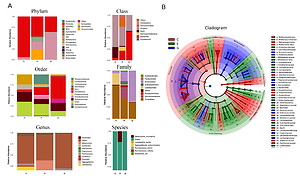Current issue
Archive
Manuscripts accepted
About the Journal
Editorial office
Editorial board
Section Editors
Abstracting and indexing
Subscription
Contact
Ethical standards and procedures
Most read articles
Instructions for authors
Article Processing Charge (APC)
Regulations of paying article processing charge (APC)
NEUROLOGY / RESEARCH PAPER
Pathogenic mechanism of intestinal microbiota involved in Guillain-Barre syndrome and with Bifidobacterium intervention
1
Department of Medical Examination, Bengbu Medical College, Bengbu, China
2
Department of Neurology, First Affiliated Hospital of Bengbu Medical College, Bengbu, China
Submission date: 2020-06-30
Final revision date: 2020-10-02
Acceptance date: 2020-10-03
Online publication date: 2021-05-09
KEYWORDS
TOPICS
ABSTRACT
Introduction:
Guillain-Barré syndrome (GBS) is an acute immune-mediated polyneuropathy, involving the peripheral nervous system. The pathogenicity of GBS involves Th17/Treg imbalance, which may be affected by intestinal microbiota. From the previous study, treatment with Bifidobacterium infantis (B. infantis) significantly improved the symptoms of experimental autoimmune neuritis (EAN) through reducing the levels of IL-17A. In the present study, we aimed to further investigate the pathogenic mechanisms of intestinal microbiota involved in GBS, with the intervention of Bifidobacterium.
Material and methods:
Lewis rats (n = 18) were injected with P253-78 peptide and complete Freund’s adjuvant to induce the EAN model. The clinical scores, hematoxylin-eosin (HE) staining and transmission electron microscopy at day 15 after immunization were used to determine the pathological changes. The levels of IL-17, IL-10 and transforming growth factor- (TGF-) and the proportions of Th17 and Treg cells in lymphocytes of blood samples were used to decide the Th17/Treg imbalance. The intestinal microbiota was detected using 16S rRNA technology, and the bacteria with significant changes were also detected in fecal specimens of GBS patients.
Results:
B. infantis improved EAN, by decreasing clinical scores and pathological changes, thus improving Th17/Treg imbalance. Moreover, the number of Lactobacillus, Ruminococcus and Clostridium were significantly reduced whereas the number of Akkermansia, Escherichia and Coprococcus significantly increased in the EAN group, which was abrogated by B. infantis.
Conclusions:
Imbalance of Th17/Tregs expression induced by imbalance of intestinal microbiota may get involved in GBS. However, B. infantis intervention can regulate Th17/Treg balance by regulating imbalanced intestinal microbiota, thus improving GBS.
Guillain-Barré syndrome (GBS) is an acute immune-mediated polyneuropathy, involving the peripheral nervous system. The pathogenicity of GBS involves Th17/Treg imbalance, which may be affected by intestinal microbiota. From the previous study, treatment with Bifidobacterium infantis (B. infantis) significantly improved the symptoms of experimental autoimmune neuritis (EAN) through reducing the levels of IL-17A. In the present study, we aimed to further investigate the pathogenic mechanisms of intestinal microbiota involved in GBS, with the intervention of Bifidobacterium.
Material and methods:
Lewis rats (n = 18) were injected with P253-78 peptide and complete Freund’s adjuvant to induce the EAN model. The clinical scores, hematoxylin-eosin (HE) staining and transmission electron microscopy at day 15 after immunization were used to determine the pathological changes. The levels of IL-17, IL-10 and transforming growth factor- (TGF-) and the proportions of Th17 and Treg cells in lymphocytes of blood samples were used to decide the Th17/Treg imbalance. The intestinal microbiota was detected using 16S rRNA technology, and the bacteria with significant changes were also detected in fecal specimens of GBS patients.
Results:
B. infantis improved EAN, by decreasing clinical scores and pathological changes, thus improving Th17/Treg imbalance. Moreover, the number of Lactobacillus, Ruminococcus and Clostridium were significantly reduced whereas the number of Akkermansia, Escherichia and Coprococcus significantly increased in the EAN group, which was abrogated by B. infantis.
Conclusions:
Imbalance of Th17/Tregs expression induced by imbalance of intestinal microbiota may get involved in GBS. However, B. infantis intervention can regulate Th17/Treg balance by regulating imbalanced intestinal microbiota, thus improving GBS.
Share
RELATED ARTICLE
We process personal data collected when visiting the website. The function of obtaining information about users and their behavior is carried out by voluntarily entered information in forms and saving cookies in end devices. Data, including cookies, are used to provide services, improve the user experience and to analyze the traffic in accordance with the Privacy policy. Data are also collected and processed by Google Analytics tool (more).
You can change cookies settings in your browser. Restricted use of cookies in the browser configuration may affect some functionalities of the website.
You can change cookies settings in your browser. Restricted use of cookies in the browser configuration may affect some functionalities of the website.



